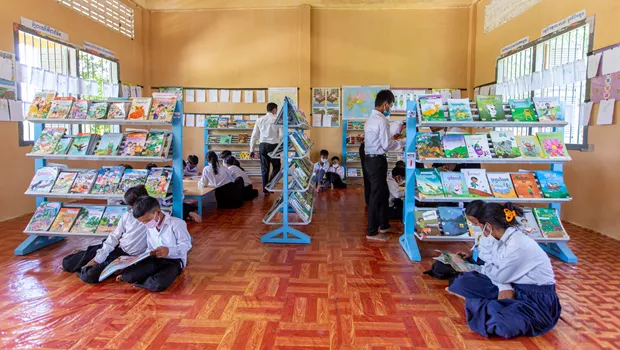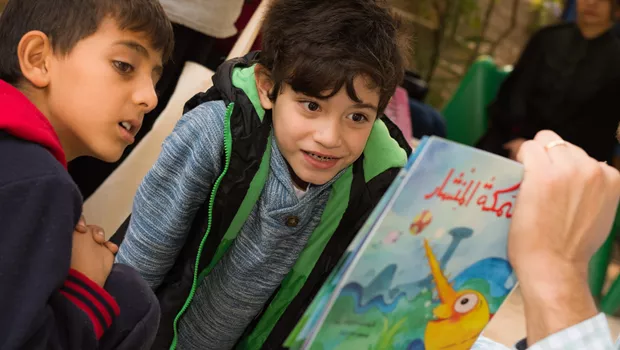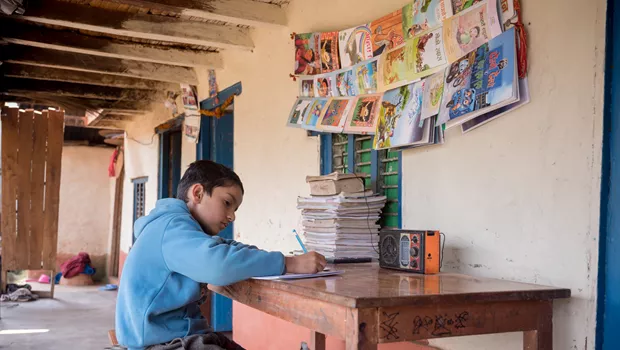Libraries are an essential component of our Literacy Program, helping to reinforce foundational literacy skills and engaging students with diverse local language book collections and a welcoming environment needed to build a habit of reading. Room to Read’s literacy team works in partnership with local schools, educators and caregivers to establish these child-friendly library spaces — both in schools and at home. We also train librarians to effectively manage a library and conduct reading activities that encourage a love of reading.
Our literacy team works in partnership with local schools across our partner communities to scale and adapt our library model to benefit more children. Read on to explore just a few of the many exciting updates from Room to Read libraries across the globe!
In Tanzania
In historically under-resourced communities in Tanzania, a shortage of school libraries, high book procurement costs, limited access to at-home reading and a shortage of teachers trained in reading activities all create a vicious cycle of illiteracy. Schools in these communities often struggle to build strong reading cultures and habits among children.
Room to Read is working in collaboration with the Tanzania Institute of Education to pilot a new kind of school library — one that addresses the challenge of limited space within overcrowded schools. These libraries incorporate all of the elements of the Room to Read library model — the creation of a welcoming, child-friendly space filled with diverse, high-quality books in local languages, the implementation of library reading activities like read-alouds, paired reading and independent reading, and ongoing teacher trainings — within individual classrooms and in refurbished shipping containers. 
In the coming year, we will test and assess the implementation of these libraries to identify future opportunities for expansion and government adoption. And we will continue to promote and advocate for the importance of libraries in government primary schools nationwide.
In Cambodia
In 2020, Room to Read formed a national library partnership with the Cambodian Ministry of Education, Youth, and Sports. The goal of the partnership was simple: promote quality library programming in primary schools across the country.
By the end of 2021, Room to Read had successfully led a government working group to create a national library package — one guided by our library model. The package includes guidelines on library management, a suite of library activities, a guide to categorizing books based on the difficulty of the text — otherwise known as book leveling — and suggestions for enhancing community engagement around the initiative. 
The inclusion of Room to Read’s library model in Cambodia’s national library package has placed Room to Read in a unique position to support the rollout of the package and the training of teachers and government library specialists on effective library programming.
In India
Room to Read currently has a two-pronged strategy to scale our library model across India. To start, we provide technical assistance to state governments to develop library resources and design professional development programs for teachers and government officers. We then collaborate with state governments to scale key library components in specific regions. Since 2019, Room to Read has partnered with the Maharashtra state government to scale the Room to Read library model in the historically under-resourced Nashik district, containing more than 3,200 schools, through the creation of cluster libraries. 
The cluster library approach adapts the Room to Read library model to maximize available resources within a particular region, or cluster of schools. Clusters of 10–15 schools rotate a collection of 1,500 quality storybooks each month for two to three years to ensure students in under-resourced districts have consistent access to diverse reading material. Reading corners are established in all schools within a cluster, utilizing small spaces within classrooms to create inviting reading areas filled with captivating storybooks that are easily accessible to young readers. As part of the library model, Room to Read trains teachers, librarians and government partners on library management practices and provides educators with the coaching needed to deliver effective reading activities in the library space.
Recently, Room to Read integrated a community and parent engagement initiative to further scale our library model. Through this initiative, Room to Read helps parents create at-home learning environments and libraries that encourage and support a child’s habit of reading. Parents and caregivers receive quality reading materials and worksheets and are trained to use materials with their children in their home learning spaces.
In Vietnam
Room to Read first began a long-term partnership with the Vietnamese Ministry of Education and Training (MOET) in 2018 to incorporate Room to Read’s library model into Vietnam’s national library policies. The MOET, recognizing the effectiveness of Room to Read’s library model, has since invested heavily in the rapid scale-up of the approach. From the formation of our partnership in 2018 to 2021, the MOET implemented 1,320 expansion libraries — libraries that use Room to Read’s design and programming but are completely led and implemented by government partners. 
Following this period of growth, Room to Read is now working to have our library model integrated into the new national library standards and rolled out nationwide. Our goal is to support the implementation of 1,800 expansion libraries in 29 new Vietnamese provinces by the end of 2025. Government officials are keen to gain Room to Read’s expertise in developing library standards and have included Room to Read as the only NGO in the drafting committee for the new national K–12 library standards.
In South Africa
Recently, our team in South Africa hosted its first annual library conference focused on the critical role school and classroom libraries play in helping children develop literacy skills and a habit of independent reading. 
Notable conference speakers include Executive Director of the Puku Children’s Literature Foundation, Elinor Sisulu, Chief Director of Foundations for Learning at the Department for Basic Education, Kulula Manona, faculty from Wits University and representatives from the Zenex Foundation — a Room to Read NGO partners — and New Africa Books. These local leaders in education and book publishing will discuss the government’s goal to have all students under the age of 10 reading for comprehension by 2030 and how integrating components of Read’s library model into school systems can help the country meet this goal.
In Laos
Since 2018, Room to Read has partnered with Save the Children and Humanity & Inclusion to form the USAID Learn to Read Activity consortium, a five-year project, which culminated in 2023. Through the Learn to Read Activity, Room to Read led the development of library reading corner programming, which adapts the Room to Read library model for small spaces within the classroom environment. We’ve worked closely with the Laos Ministry of Education and Sports (MOES) to implement these adapted library reading corners in pre-primary, Grade 1 and Grade 2 classrooms across the country, supporting the literacy and language development of more than 40,000 students. 
Recognizing the success of this programming, USAID has initiated discussions with the consortium to create a two-year extension of the Learn to Read Activity, running through 2025, which would allow Room to Read and the Laos MOES to bring the reading corners into more schools. Moreover, we've partnered with the Luang Prabang Teacher Training College to develop and pilot a pre-service library curriculum for teacher trainees, helping to ensure all children have access to well-trained, highly skilled teachers.
Evidence suggests that, when coupled with a supportive environment, initiatives that focus on both reading skills and the habit of reading can result in significant and sustained improvement in children’s reading levels.



